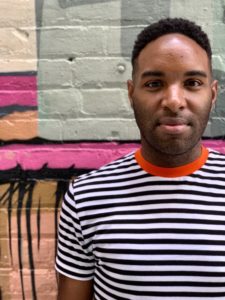By Tom Travis
As Pride month comes to a close and Flint prepares for its own Pride Fest EVM spoke with seven members of Flint’s LGBTQIA+ community to find out what pride means to them and how they celebrate pride month.
Flint Pride will have a cookout from 2 to 6 p.m. Friday, June 25 in the parking lot of the Wellness Clinic, 311 E. Court St. The event will feature a DJ, vendors and free HIV and HEP-C testing. For more information, those interested can call (810) 232-0888.
“I was in bondage.” – Jones
Christopher Jones, 34, of Flint Township, a program director in the School of Social Work at the UM-Ann Arbor, describes the first nearly three decades of his life as “bondage.” Jones came out when he was 29 but describes the first nearly three decades of his life as “bondage.”

Christopher Jones (Photo source: C. Jones)
He describes it as “bondage” because he says he was taught that being gay was wrong, it was a sin and so many people are homophobic “I didn’t feel safe coming out in those first 29 years”. “In those 29 years I missed a lot of opportunities to be proud and live in pride,” Jones says.
“Everyone I came out to was open and accepting. including my father who is a black Pentecostal preacher, and my mom and my family were all open and accepting. ”
Jones added, “In the Black church homophobia is on the rise and has always been. In my family and in my circle of friends, no one turned their back on me or turned me away.”
During Pride Month Jones says he celebrates by attending various pride events and enjoys hearing coming out stories from people of different backgrounds.
“They put pressure on me to not be so obvious.” – Johnson
Dee Johnson, 61, a registered nurse came out at age 23, in the mid-80’s. “I had a group of friends that I hung out with, a group of older lesbians,” she recalls. “We’d go to bars and concerts. But outside of that they were ‘faking straight’.
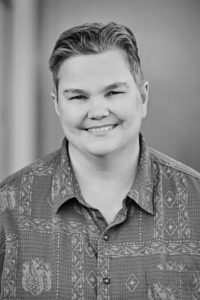
Dee Johnson (Photo source: D. Johnson)
“I had a really hard time with that. I loved those people and I loved hanging out with them but I had a hard time with them because they put pressure on me to not be so blatant, not to be so obvious. It was such a hard thing.
“You love somebody and love being with them but you’re not really living truth at other places. I didn’t come out to my family for quite a while. Although they probably had their suspicions,” Johnson reflects.
“My first partner was very much along the lines of the group of lesbians that we hung out with at that time. We were gay, we could be out at the women’s festival, we could be out at home but if you’re going to a family function that’s all off the table. I think that’s one of the things that made it hard for us. When my partner at that time went away to college I began to struggle with how to be more open.”
Johnson recalls, “My favorite part of my coming out story was one day I was out with my mom. I had been trying to figure out how to tell her I was gay. I had decided I can’t live this kind of life anymore. I need to be honest everywhere I’m at.”
“This doesn’t really work if you’re not honest — if you’re not honest you don’t have real relationships. You have fake stuff everywhere and I didn’t like that.”
Johnson recalls, “My mom and I had gone out shopping and I was struggling with how to broach the subject of me being gay. We drove by the Unitarian Church and my mom points to the church. She says, ‘you know they have a group there for parents of gay children who have problems with it.’ So I asked her if she had any problem with that? She said, nope.”
Johnson’s mom then said that she was fine with her being gay and that she had always kind of known anyway. “My sister knew that I was gay and she was fine with it. My brother took a little longer to come around to accepting it,” she says.
Johnson adds that she was concerned with how her brother would react because of his kids, Johnson’s nieces and nephews. She wasn’t sure if her brother would want her to be around them. She says he eventually came around and was fine with his sister being gay.
“I’m gay, this is who I am.” – Johnson tells her employer
Johnson describes some good and some bad work situations she’s had through the years because of being gay. “I worked as a nurse at Hurley for 24 years and I never had a problem there related to my sexuality and I was very open. But when I went to another job the boss changed between the time I took the job and I started working there.
“The new boss was very homophobic. I ended up being fired within eight months and most of me being fired had to do with me being gay, it was a conflict. As I began looking for another job in the interviews I told the company that I was gay, this is who I am.”
The people she interviewed with told her she shouldn’t say that. Johnson explained to them, “Listen I don’t want to work for you if you don’t want me here.”
“Coming out was the best thing. Honestly coming out in the 80s, being who you were, being gay, at work and at home and everywhere you go was probably one of the most radical things I’ve ever done. It gave a chance for people who didn’t quite get it to be able to ask questions,” Johnson says.
Johnson recalls at one of her jobs there was a co-worker who was struggling with her own daughter’s coming out. Johnson had an Aids poster hanging in her work area. The woman came to her one day pointing at the poster and said, “I don’t like that.” Dee responded by asking her, “Okay, tell me why you don’t like that.”
She proceeded to tell Dee that she didn’t think being gay was okay. Dee said, “Well I’m gay does that mean you have a problem with me?”
Eventually that co-worker was okay with her daughter being gay because she could see in Johnson there were positive gay relationships and a positive way people can be gay. Johnson explained that her co-worker was fearful that her daughter couldn’t live a good life being gay.
Johnson says to her, Pride means visibility. “Visibility is every day and it’s especially important if you’re just getting comfortable with who you are,” she asserts. “I’ve been at my present job for 15 years and I have a pride poster hanging in my work space.”
“It’s about time that we’re noticed.” – Hammons
LaQuanda Hammons, 37, a site manager for Flint & Genesee Chamber of Commerce, says that Pride Month is one of her favorite times and loves it. Hammons says, “It’s about time that we’re noticed. We’ve gone through a lot of negative emotions being a part of the LGBTQ community. So I’m excited that we have a platform that we can stand on.”
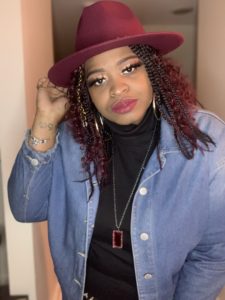
LaQuanda Hammons (Photo source: L. Hammons)
“I think back to when I was in middle school or high school and my mom says that she has always thought I was gay. I knew that I like men and women. I would argue with people and get upset and say I’m not gay. It became important for me to be identified properly,” Hammons says.
Hammons explains how she came out: “I came out officially on St. Patrick’s Day of this year. Everyone welcomed me and congratulated me. Coming up in school it was really hard. People would accuse you of being gay, people are cruel, people treated me mean. But coming out and having that support meant so much. I’ve always known that I was bisexual but it was hard to actually admit it.”
Hammons says she grew up in “a super religious family.” I was taught you’re going to burn in Hell if you were gay and being gay is wrong. “So that really kept me from being honest about who I really was.
Hammons says, “I finally got to the point where I knew God still loved me for who I was. I was taught that I couldn’t be my authentic self. It took me some years to get there.”
Hammons says that she even corrects her mom about her identity. “My mom says, ‘I always knew you were gay.’ And I say now be careful because I still like men but I entertain women as well. If you’re going to label someone you want to have the proper label.” Hammons says that her father is also “very accepting” of her identity.
Last year Hammons attended Pride Fest in Miami and enjoys being able to learn about the LGBTQIA community through the events. Hammons’ message to those still “in the closet” is, “Find someone you trust. Someone that is safe and get those feelings out. I know for years I kept those feelings bottled up. On some days I would ponder is life worth living because I can’t really live my life the way I want to. ”
“We’re sexualized before we’re humanized.” – Mabbitt
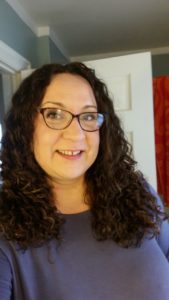
Melodee Mabbitt (Photo source: M. Mabbitt)
Melodee Mabbitt, 40, is an intersex woman who wishes she could have met other intersex people before confirming at age 25 in series of medical exams that she was born without a uterus and vagina. Mabbitt says she has always known about her body, and the most comforting part of being diagnosed was finding other intersex people.
Mabbitt says that there are support groups for intersex people where they often discuss the traumas resulting from their medical treatment. Mabbitt sees pride as an opportunity for intersex people to find each other without having to go through traumatic medical experiences to access the comfort of knowing other intersex people.
Mabbitt explains, “I think it’s important for me and for other intersex people to show up for pride. A lot of people are diagnosed as intersex at the doctor’s office and it’s treated like a medical condition. Just like being gay or Trans isn’t a sickness that needs to be treated, the same is true for intersex people. So we need to be able to talk about ourselves publicly, without shame, in normal places like pride festivals.”
“Being an intersex person is not a traumatic experience, but being treated like you have a disease just because you have variations on your body is traumatic,” said Mabbitt. “If you want to help intersex people, help us get rid of the notion that any child’s genitals tell you about their gender or sexuality. My friend Esther always points out that we’re sexualized before we are humanized. Let kids grow up as kids without carving ideals of gender and sexuality onto our bodies without our consent before we can talk.”
Mabbitt, a Flint East Sider and graduate of UM-Flint, took to Facebook to express herself as an intersex person. She explains and expresses her struggles and joys of discovering what it means to be an intersex person.
“Growing up I thought I was all alone.” – Shooltz
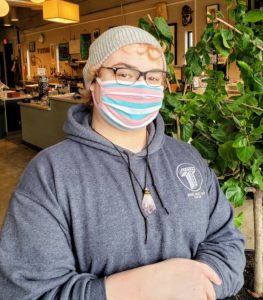
Diana Shooltz wears her trans flag mask at Totem Bookstore, where she works (Photo by Tom Travis)
Diana Shooltz, 21, of Davison identifies as a transgender woman. “I knew I was a woman since I was about four years old. I questioned myself more and more until I finally came out when I was 14. I started to transition in November (2020) by taking estrogen. I’ve been able to come out to each of my parents fairly recently, in January and February of this year.”
I was very lucky,” Shooltz says. “They each took it a lot better than I expected. My mom was a little nervous and my dad was completely on board with it. He just looked at me said, “Okay, good for you.” So I was very happy.
“Growing up I always thought that I was alone. And if I was to open up to anyone and truly told them how I felt about myself I thought that I would never hear the end of it and be shamed by them.
“I think Pride is a way of comforting that past self that lives in you a little bit. It’s a way of telling yourself that it’s okay and you’re not alone. In fact, you’re so much less alone than you ever thought possible.
“I’ve been fairly lucky in that I haven’t dealt with a lot of harassment from people. This is my first job where I’ve been out publicly and everyone here is very welcoming. I think a hard part for me is seeing how much work is going to have to go on with the image of myself.
“It’s not like oh I take these pills once a day and I’m not going to be exactly as I pictured myself to be as a kid. There’s still a lot of work to be done,” Shooltz says.
Shooltz adds one thing that helped her to come out was finding an online community. A friend she met in one of the online communities was Amethyst. “She was the first publicly out trans person I had ever met,” Shooltz says. “And talking to her and asking her about her experiences resonated with me so deeply inside. That was a main tipping point to be able to help me question myself more and more.”
“Pride means freedom….It means to be yourself.” – Groce
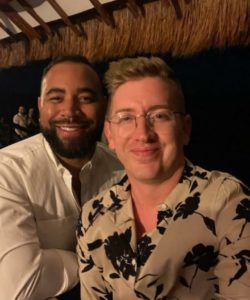
Quentin Groce (left) and Josh Fortney engaged for a 2022 wedding. (Photo source: J. Fortney)
Quentin Groce, 35, Account Director Marketing Consultant at MLive, and Josh Fortney, 32, a nurse for the GHS Crisis Stabilization Team have been together for eight years in August and are engaged to be married in 2022.
Fortney grew up in Clio and graduated from Clio High School. He explains he came out at age 16 while he was switching schools. He recalls being called names and teased at school. “I hid my true sexuality from my parents and others,” Fortney says.
Fortney recalls a painful experience of being turned away from a blood drive. He explains, “We received extra credit as honor society students for donating blood.” Out of precaution Fortney was tested for HIV at the Genesee County Health Department downtown Flint. With the negative test results in hand, he was confident in donating blood but was turned away.
“It made me feel upset and that I was somehow tainted, but I wasn’t. I walked home from school that day. I didn’t go to classes for the rest of that day. I was pretty upset.”
Groce explains that he came out “later in life.” Growing up in the Grand Rapids area, it wasn’t until his sophomore year at Grand Valley University at age 21 that he came out. Groce grew up in a Catholic family, on his mom’s side and and Episcopal family on his dad’s side.
“I wouldn’t say my parents were anti-gay but it wasn’t something they had to deal with in their life. Mom felt it was more of a nurture situation rather than being a nature situation, being gay. I didn’t talk to my dad about it for about a year or a year and half after coming out,” Groce says.
“Pride means freedom, a free space to truly engage with all those in the community. It means to me to be free, to be yourself and to know that despite the fact that you are different there are others just like you and you’re able to find that community,” explained Groce.
Groce recalls, “Two years ago I went to Detroit Pride Fest. It was the year that there was a Nazi protest at the pride festival. The Nazis were on the other side of the street from the Pride Fest. The Nazi group actually came across the street.
“For me it was really the first time I had seen the police force out there to protect my personal interests, to watch the police make a barrier to protect those of us at the pride fest while the Nazi people shouted profanities and derogatory comments.”
“I come from a mixed race home. My dad is Black. I never really received great treatment from the police and that was the first time to see the police made sure, that we as a gay community, we were protected.”
Fortney mentions that he and Groce have met a lot of people, traveling to Pride Fests in Chicago, Detroit, Flint and Grand Rapids, who still live in tiny little towns and they come out in June of every year to live their best life. They take time each June to travel and visit other pride fests.
Groce comments that Fortney’s family integrated faster to having a gay couple than his own family. They each say it took time for their families but now both families are integrated and welcome both Groce and Fortney into each of their family functions and even travel together and celebrate holidays together.
Groce adds, “In my opinion LGBT people need a place to continue to meet that bridges the gap between generations. Flint and Genesee County really need a common meeting place for all those in the LGBTQ+ community.”
EVM Managing Editor, Tom Travis, can be reached at tomntravis@ gmail.com.

